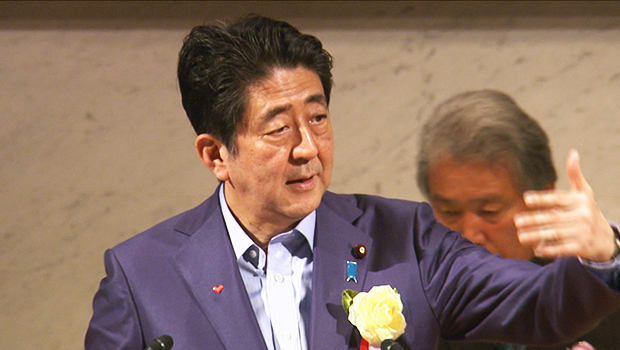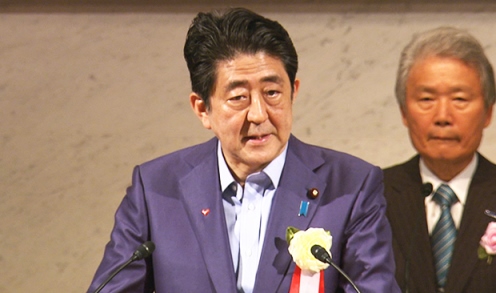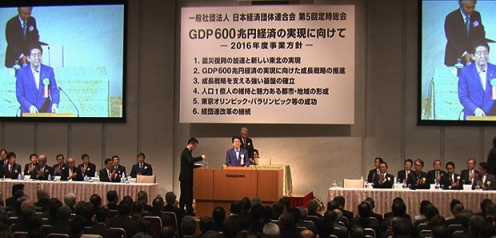Home > News > The Prime Minister in Action > June 2016 > Regular General Meeting of the Nippon Keidanren
The Prime Minister in Action
Regular General Meeting of the Nippon Keidanren
June 2, 2016
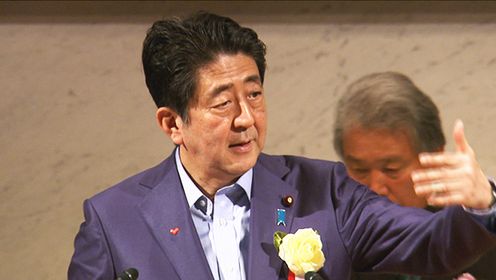
Photograph of the Prime Minister delivering an address (1)
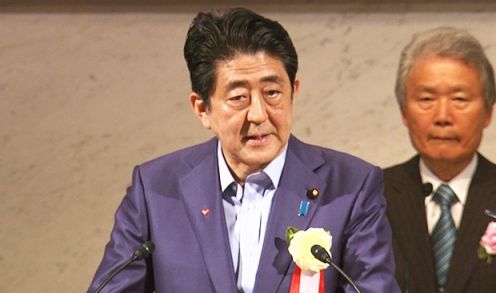
Photograph of the Prime Minister delivering an address (2)
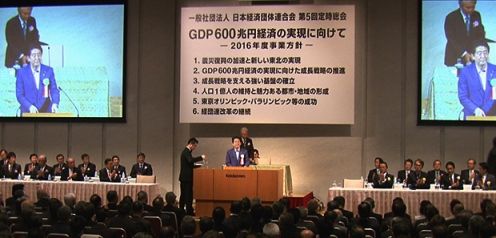
Photograph of the Prime Minister delivering an address (3)
[Provisional Translation]
Prime Minister Shinzo Abe attended the Regular General Meeting of the Nippon Keidanren held in Tokyo.
In his address, the Prime Minister said,
“Thank you very much for inviting me here today.
In the three and a half years since the change of government, I have worked towards exiting from deflation, and strongly advanced Abenomics. We have implemented reforms in rapid succession, including corporate tax reform, economic partnerships such as the TPP, complete liberalization of the electricity retail market, and agricultural reforms for the first time in 60 years.
With these measures, employment has increased by 1.1 million people, while regular employment has grown for the first time in eight years, with an increase of 260,000 people. Meanwhile, the ratio of job offers to job seekers has reached 1.0 or above in all 47 prefectures for the first time in history.
The number of bankruptcies of SMEs has declined by 30% compared to before the change in administration, the lowest level in 25 years.
With corporate earnings at the highest in history, all of you here today, as well as other members of business and industry, have truly made great cooperative efforts, and wage increases has been realized. I know that every time I speak to you, I keep talking about wage increases, and it was through your support that we have been able to realize an increase in base pay for three years in succession. Since the start of this century, the highest ever level of wage increases, including for SMEs, has been realized three years in succession.
Although it is still only half-complete, there is no question that Abenomics is producing results.
However, immediate issues facing us include the decrease in commodity prices and the drop in investment, which are negatively effecting the economies of emerging and developing countries. There is a possibility that the global economy will lose its growth engine. There are concerns about the drop in global demand and the deceleration of growth. In regard to these risks faced by the global economy, the leaders who gathered at the G7 Ise-Shima Summit shared this awareness, and agreed to commit to reinforce efforts to address the current economic situation by taking all appropriate policy responses in a timely manner, as expressed in the Leaders’ Declaration.
The recent earthquakes in the Kumamoto region caused major setbacks to peoples’ lives and to the economies of Kumamoto and Oita, including the tourism, agriculture, and manufacturing industries.
These comprise new downward risks that, in the worst scenario, could lead the Japanese economy into a reverse decline back into deflation.
We must put the engine of Abenomics on full steam ahead to sweep away these risks. I am determined that, as the G7 President, Japan will take the lead in moving to implement the G7 agreement reached there. In order to further accelerate Abenomics, as I said yesterday, this autumn we plan to carry out comprehensive and bold economic measures.
We will carry out structural reform, and stimulate private-sector investment that will create future growth.
In addition, we have decided to postpone the increase in the consumption tax by 30 months to October 2019.
However, we will not lower the flag of fiscal rehabilitation. There is no change in the basic policy that there can be no fiscal soundness without economic revitalization.
Immediately after my press conference yesterday, in Chairman Sakakibara’s press conference, he made a comment that “the business world respects this extremely difficult political decision.” I was very reassured to receive his understanding in regard to my indication of my strong determination that I will never let the Japanese economy fall back again into deflation.
In regard to the TPP, we aim for its early coming into effect, seeking approval at the next Diet session.
The Japan-EU EPA, like the TPP, is another measure to build a free and fair economic zone, between nations that share the same basic values. The three bases of Japan, the US, and the EU will collaborate to strengthen the foundation of economic mechanisms suitable to the 21st century, and we will expand the territory where the rule of law is in place and investments can be made with peace of mind, including emerging economies in due course.
We will soon formulate the Japan Revitalization Strategy 2016 and the Plan to Realize the Dynamic Engagement of All Citizens, in conjunction with the Basic Policies.
In the second stage of the growth strategy, new germs of growth will lead to positive trends in society as a whole. We will resolve social issues by leveraging new technology. We will unearth and refine promising markets. The keys to this are the fourth industrial revolution and Society 5.0.
Up until now, Japan’s Internet-related companies have been under overseas control in terms of their platforms such as data terminals and search engines, and unfortunately were relegated to subcontractor-type positions, with little added value.
However, competition will begin now to build platforms for the sharing and utilization of real-world data in fields where Japan excels, such as healthcare, manufacturing workplaces, and automated driving. The stage will change. If we can respond rapidly, it will also be an opportunity to realize a productivity revolution that will overcome the population decline, as well as create new services that can respond to issues such as the aging society.
For example, in the healthcare field, by integrating data collected by sensors on data terminals attached to the body with healthcare reimbursement statements and health check data, it will become possible to conduct preventative care and provide health service in a manner adapted to each individual’s state of health, and lifestyle-related diseases will be dramatically reduced.
At manufacturing workplaces, by linking the data of the overall supply chain, as soon as an order is received, the necessary parts can be decided, enabling a substantial reduction in inventory. Consumers will be able to purchase the products they like, at a low price and at any time. If data from sensors built into production equipment is analyzed, through preventative maintenance services, the stoppage time of a product line will be substantially reduced.
The industrial reforms conducted up until now will change considerably. Accordingly, we will fundamentally rearrange the industrial policies conducted up to this point.
We will establish the Fourth Industrial Revolution Public-Private Council as a control tower for our efforts to advance reforms in a speedy manner and, along with the industrial world, will address three important tasks.
Firstly, we will identify promising fields such as health and medical care, and establish a platform for sharing and utilizing data that transcends corporate and organizational boundaries.
Secondly, we will read trends in technological innovation, and proactively create new frameworks for reform of regulations and systems.
And thirdly, in order to attract outstanding human resources from overseas, we will create a ‘Japan-version green card for highly skilled foreign personnel’ whereby the length of time required to obtain permanent residence in Japan is drastically reduced to make it the fastest in the world.
In the Public-Private Dialogue towards Investment for the Future meetings that were held from last October to this April, Chairman Sakakibara consistently offered forward-looking comments.
He indicated that, if the necessary policy measures are carried out, there is the prospect that capital investment to the extent of about 80 trillion yen will be realized in FY2018, exceeding the situation of before the Lehman shock. In acknowledgement of this, the government has realized a drop in the effective corporate tax rate to the 20%~29% range.
His proposals for projects to realize an economy with a GDP of 600 trillion yen comprise a pillar of the growth strategy.
With the cooperation of all of you, we will realize the powerful growth of the Japanese economy that can respond to global expectations.
The recent G7 Ise-Shima Summit began at Ise Jingu. The G7 leaders experienced the long-standing history, culture, and tradition of 2,000 years. I believe that they also experienced the sensibility of the Japanese people in terms of seeking coexistence with nature.
In the Summit discussions, we were able to share an understanding on accurately assessing the risks faced by the world, and the need for the G7 to thoroughly fill the role of driving the economy. Moreover, for global peace and stability, it is we who share the fundamental values of freedom, democracy, the rule of law, and human rights, as well as the market economy, who must decisively play that role.
By fully implementing the rule of law, freedom of navigation and the free travel and exchange of people, as well as trade, can be secured. We shared the understanding that this is the foundation of global prosperity.
I believe that the G7 countries, including Japan as the President, bear serious responsibilities. We must now properly fulfill these responsibilities.
After the Summit, President Obama visited Hiroshima. The President of the only country in the world to have used an atomic bomb came to Hiroshima, with the Prime Minister of Japan, the only country in the world to have been the victim of an atomic bomb during wartime. We paid our respects to the atomic bomb survivors, and declared our wish for a world without nuclear weapons. I am convinced that this was a major step towards realizing a world without nuclear weapons.
The Japan-US Alliance has become “an alliance of hope” whereby together we are able overcome major global challenges such as this one. I would like Japan to continue to work with the US, as well as working in partnership with the other countries of the world, to fully contribute to global peace and security, and to protect our children’s future.
In order to truly realize these things, we must be victorious in the upcoming House of Councillors election. I would like to conclude my remarks by saying that, in order to be victorious in this election, and to continue realizing the things that we have promised, with the entire Cabinet working as one, and prioritizing economic growth, I vow that I will exert my utmost efforts. Congratulations on such a successful gathering.”

